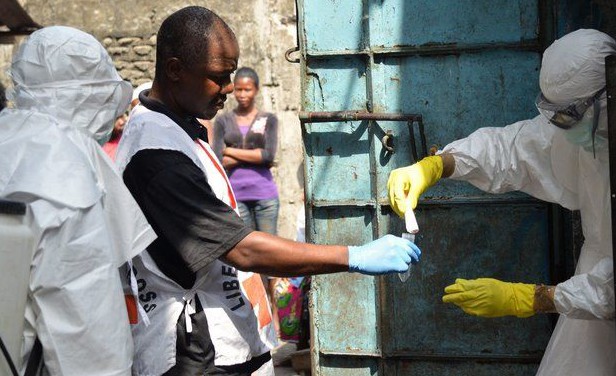
Three new cases of Ebola were reported in Liberia on Thursday, more than two months after the World Health Organization (WHO) declared the country free of the deadly virus. The return of Ebola to Liberia marks a major setback in the fight against the disease, raising serious concerns that Ebola will remain a perpetual threat in the West African region.
The three new cases include a 10-year-old boy, who was the first to fall ill, and two of his family members from Paynesville, a suburb of the capital Monrovia, said Liberian Minister of Health Bernice Dahn. The boy became sick on Nov. 14 and sought medical help three days later at a hospital in Monrovia, where his infection with the deadly virus was confirmed Thursday. Two of his siblings also tested positive for Ebola on Thursday.
All three patients, as well as three other high-risk contacts, were admitted to an Ebola Treatment Unit on the outskirts of Monrovia, and more than 40 additional contacts are being closely monitored for symptoms. According to the New York Times, at least seven healthcare workers may have had contact with the boy at the John F. Kennedy Medical Center in Monrovia before his illness was detected and while not wearing adequate protective gear.
“The hospital is currently decontaminating the unit. All of the healthcare workers who came into contact with the patient have been notified,” Dahn said in a statement on Friday. “We know how Ebola spreads and we know how to stop Ebola but we must remain vigilant and work together.”
In September, the WHO officially declared an end to the Ebola epidemic in the country, which has seen more than 10,600 cases of the disease and 4,808 deaths, according to WHO figures. This is the fourth wave of the virus to hit Liberia since the outbreak was first declared in March 2014.
“It is possible that we will find more cases,” Dahn, said. “The key is to stop it, find the source, and prevent the next one.”
But in this case, the source of the 10-year-old boy’s infection is a mystery, said WHO’s special representative on Ebola, Bruce Aylward.
“The child has no known history of contact with a survivor or being at a funeral or travel or the other factors we normally look for in the initial investigation to explain a new case,” Aylward said in a media briefing. While the investigation is ongoing, Aylward said it’s likely the boy’s case is not part of the original outbreak, but may be due to the persistence of the virus in some survivors who can then pass it along to others.
Recent studies have shown that the virus can live in semen, ocular (eye) fluid, and other parts of the body long after it appears to be cleared in patients’ blood. In October, researchers at the Centers for Disease Control and Prevention (CDC) published a study showing that the virus can persist for as long as 9 months in the bodily fluids of Ebola survivors. Perhaps most worryingly, the research also showed that the virus found in male survivors’ semen can live for up to 8 days even once it is outside of the body (i.e., in discarded condoms and soiled clothing or linens), expanding the risk of infection far beyond sexual transmission.
Aylward said these findings reflect “a fundamental shift and change in the epidemiology of the outbreak.”
“This is the seventh event where we cannot rule out the possibility that we’re seeing a flare of the disease because of its emergence from a survivor population,” he explained. The other suspected cases were found this summer through the fall in other parts of Liberia, as well as in neighboring Sierra Leone and Guinea.
Since the spring of 2014, more than 28,600 people have been infected Ebola and over 11,300 have died from it, mostly in Liberia, Sierra Leone, and Guinea. Liberia was the first of the three hardest-hit countries to be declared free of Ebola in May and again in September. Sierra Leone passed that milestone on Nov 7. And just last week, Guinea began the 42-day countdown (to account for two full incubation periods) from when the last patient there tested negative for a second time.
Aylward said the emphasis now is on bolstering efforts to detect and rapidly respond to new cases, and disseminating education campaigns aimed at survivors regarding issues like safe sex and breastfeeding, providing access to screening and counseling, and making sure they stay in care for any longer-term issues. With tens of thousands of Ebola survivors in the West African region, learning more about the persistence of the virus in survivors will also be critical for preventing new transmission.
Last month, Pauline Cafferkey, a Scottish nurse who contracted Ebola while doing aid work in Sierra Leone and was thought to have recovered in January, suffered from the first-known recurrence of Ebola virus. She was recently transferred in stable condition from a London hospital to one in Glasgow. Ian Crozier, an American doctor also thought to have been cured of Ebola, is now suffering from significant vision problems due to the persistence of the virus in his eye.
“We must remember that even after the last patient is discharged from the last Ebola Treatment Unit in West Africa, Ebola will still not be gone,” Dr. Adam Levine, an Assistant Professor of Emergency Medicine at Brown University, and the Principal Investigator for the International Medical Corps Ebola Research Team, said earlier this year, when Liberia was first declared Ebola-free.
Long after the outbreak is officially deemed over, Levine warned, the virus will continue to persist both in survivors and in its natural reservoirs, “waiting for the right set of circumstances to reemerge, like some mythical beast from an ancient fairytale.”
